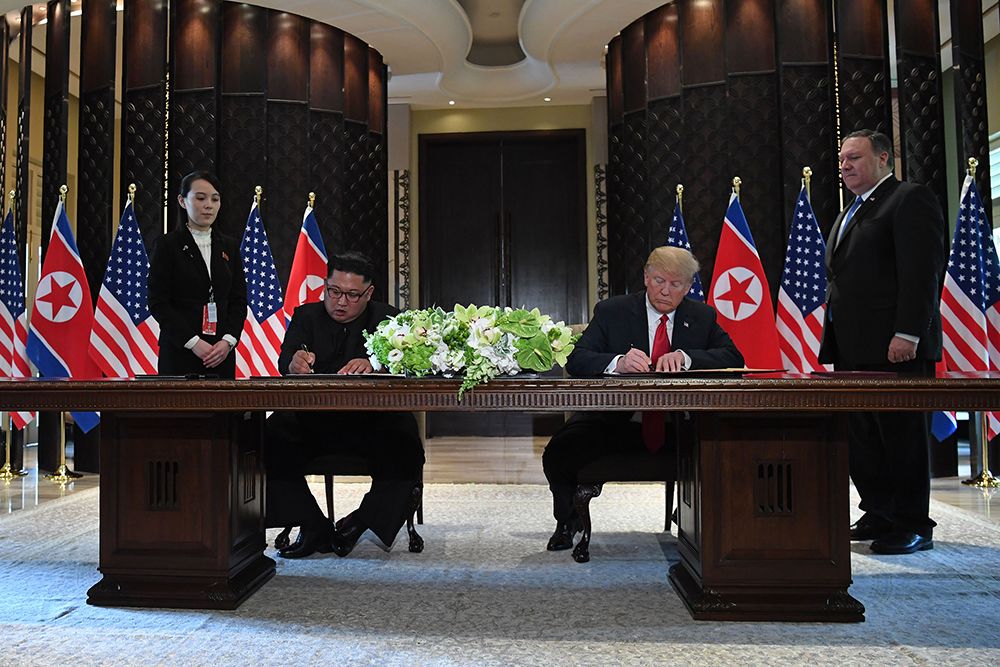More Is Possible Now to Address North Korea’s Health and Humanitarian Needs
J. Stephen Morrison. "More Is Possible Now to Address North Korea’s Health and Humanitarian Needs." CSIS Commission on Strengthening America's Health Security, Center for Strategic and International Studies, February 22, 2019. Accessed December 21, 2023. https://healthsecurity.csis.org/articles/more-is-possible-now-to-address-north-korea-s-health-and-humanitarian-needs/

As President Trump and Kim Jong-un meet for their second summit in Hanoi, will there be serious consideration given to what concrete actions can be taken to protect and advance a health and humanitarian agenda that can directly benefit North Korea’s impoverished majority and reduce the threat of a runaway tuberculosis (TB) outbreak? Perhaps. Certainly, let’s hope so. There is much that can be done.
Over the course of 2018, critically important health and humanitarian programs, though legally exempted under international and U.S. sanctions, nonetheless suffered significant collateral damage in the face of the “maximum pressure” campaign led by the United States. The Global Fund, reportedly due to U.S. and Japanese pressure, ended its malaria and TB programs in June 2018, putting at risk 120,000 persons on TB treatment, and stymying plans for dealing with an ever-increasing TB caseload, including investing in surveillance and laboratory capacities essential to arresting the epidemic. For five months beginning in late summer 2018, UN agencies and international non-governmental organizations, including both European and U.S. humanitarian organizations, with decades of combined experience operating successfully in North Korea, were driven to the breaking point as their operations were severely disrupted. In line with U.S. preferences, the UN Security Council sanctions committee slowed its deliberations to a crawl as the Trump administration held up travel approvals and the issuance of licenses from the Office of Foreign Assets Control (OFAC) and other organizations. Non-governmental organizations (NGOs), as a consequence, became consumed with the administrative burden of mounting red tape. At the same time, their donors began to question the viability of NGO operations under such stark circumstances, and their commercial vendors became increasingly reluctant to sell goods destined for North Korea in the interest of avoiding any serious legal risk. Banking facilities ceased. UN agencies cut staff and scrambled to assemble medicine and other stockpiles. Donor support to the UN annual appeal for North Korea remained stuck at less than 30 percent. The future looked bleak.
Circumstances improved somewhat at year’s end, as the UN sanctions committee and the U.S. government each began to show renewed flexibility. That shift stemmed from a conscious decision by Secretary Mike Pompeo and Steve Biegun, the U.S. special representative for North Korea—for which they should be commended—to return to the earlier approach of case-by-case review, and to take steps to clear the backlog and enhance the administration’s dialogue with NGOs. It reflected the hard-won realization that disrupting health and humanitarian operations had not induced any change in the outlook or behavior of the North Korean government. Quite the opposite, it simply stirred outrage in Pyongyang. And in the meantime, the Trump administration found itself alone and isolated, confronted with open criticism from Canada, European powers, the UN International Children’s Emergency Fund (UNICEF), Canada, China, the Republic of Korea, and not surprisingly, U.S. NGOs and their many supporters in Congress.
The deliberate subordination of health and humanitarian interests to the security agenda remains a disturbing precedent, a radical departure from accepted international norms and from the previous decades of U.S. security negotiations with North Korea. The current situation remains uncertain and fragile, and there is fear among NGOs, the UN, and donors that if the second summit fails, Washington might revert to a hardline position.
There are several sensible options that can be readily advanced. They will not interfere with international sanctions but can build confidence and goodwill, meet urgent human needs, lower serious health security threats, and build on the recent shift to greater flexibility.
There is an urgent need both to stabilize and expand tuberculosis treatment as well as arrest the dangerous epidemic of multi-drug resistant (MDR) TB (estimated at as many as 7,000 annually). The Trump administration could request the Global Fund to renew its TB and malaria programs, while calling for the UN to expedite a nation-wide survey of MDR TB.
There is a similar continued need to address chronic malnutrition (19 percent of children under five years of age), water and sanitation (54 percent of rural North Koreans use water contaminated by fecal matter, and one-third of school-aged children have diseases caused by intestinal parasites), and food insecurity (domestic food production dropped by nearly 10 percent last year because of severe weather). The Trump administration could pledge U.S. support to the UN appeal in these critical areas.
The most significant step the Trump administration could take would be to reorder the system by which both the UN sanctions committee and the U.S. government review and manage health and humanitarian programs. It could call for a rollback of excessive regulations and red tape, expand its definition of humanitarian work to include any area of assistance that effectively and accountably meets basic human needs (including clean water/sanitation and basic agriculture), and endorse the creation of a protected “white list” of designated items and the use of a general license to cover all health and humanitarian activities and related transactions. It could take steps to restore banking facilities and eliminate the risk that commercial vendors see in doing North Korea-related business with NGOs and the UN. And complementary to the possible opening of liaison offices, it could encourage the establishment of U.S. NGO offices in North Korea.
What is truly possible will no doubt be shaped by the overall Trump-Kim Jong-un talks. Whether there is progress or not in those talks, important steps can be taken today to reaffirm the neutrality and integrity of the health and humanitarian sectors and renew their vitality. That will require patience and the concurrence of the North Korean government and may require further action at the UN Security Council and in Congress. But these steps are within reach, provided there is the political will.